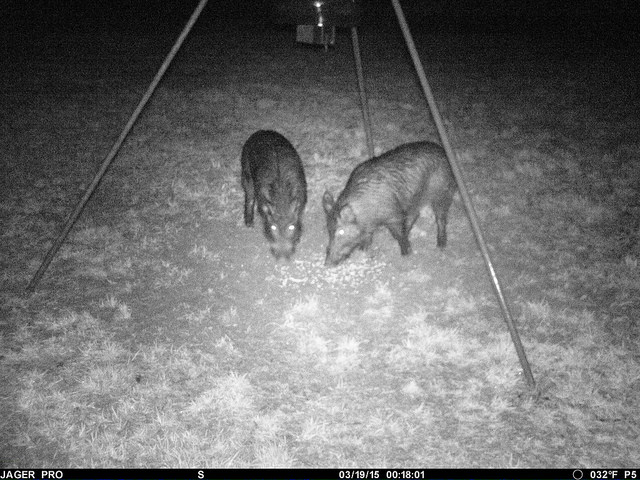Nov. 6 workshop at Batesville to address feral hog problems
By Mary Hightower
U of A System Division of Agriculture
Fast Facts:
-
- Feral hog populations expanding out of southern Arkansas
- Texas A&M study: Hogs cause $52 million in ag damage
- Nov. 6 workshop set for Batesville
(419 words)
(Newsrooms with art at www.flickr.com/photos/uacescomm/16762731639/ and www.flickr.com/photos/uacescomm/16947636912 )
LITTLE ROCK – Feral hogs are smart, omnivorous and highly adaptable, three characteristics that underlie their successful expansion into northern Arkansas, said Becky McPeake, professor and extension wildlife specialist for the University of Arkansas System Division of Agriculture.

Feral hogs have been part of Arkansas’ landscape for more than a century, she said, and while they were generally apt to stick around in the bottomlands of south Arkansas, they’re expanding.
“Their expansion faster than what we would expect normally from a naturally dispersing population,” she said. “Many experts guess that sports hunters have released domestic hogs in other areas of the state to expand their hunting opportunities, which is an illegal practice today.”
While some may enjoy hunting these hogs, farmers and homeowners whose land has been overrun are less than thrilled.
A 2013 study done by Texas A&M estimated the cost of feral-hog damage to Texas agriculture alone to be $52 million plus another $7 million for repairs and control methods. (http://overton.tamu.edu/files/2013/06/Wild-Pig-Damage-Abatement-Education-Applied-Research-Activites.pdf )
Arkansas provides an ideal place for the highly adaptable hog to thrive, with plenty of water, food and shelter. McPeake said a pregnant feral sow can produce an average litter of six, and with rapid maturity rates, “you could potentially have 31 pigs on your property from just one sow in a little over a year.”
A survey conducted a year ago found that most agents were receiving reports of feral hog damage to livestock pastures.
Nov. 6 hog workshop
Because of growing interest in controlling feral hogs, the University of Arkansas System Division of Agriculture Cooperative Extension Service and the Arkansas Forest Resources Center have teamed up with the USDA Natural Resources Conservation Service to provide materials and workshops for landowners interested in alleviating damage to their property.
The next workshop is set for Nov. 6 from 10 a.m. to 2 p.m. at the Livestock and Forestry Research Station just outside Batesville.
"Removing feral hogs isn't easy,” McPeake said. “It takes planning and developing a strategy; in other words, preparing a course of action based on what we've learned from science and research, adapting it to your circumstance, and sticking to it."
Although shooting and hunting can remove a few hogs, the primary strategy discussed at the conference is corral trapping. Representatives from the Division of Agriculture and Arkansas Game and Fish Commission will give presentations and set up trapping demonstrations.
Registration is $5 to cover lunch. Seating is limited, so attendees are encouraged to register early. Contact your local county Extension office or the state office at 501-671-2329 to register, or register online at www.uaex.uada.edu/feralhogs.
A miscellaneous publication titled "Feral Hog Control in Arkansas" can be found on our website by searching for "feral hogs” or by downloading from: www.uaex.uada.edu/publications/pdf/MP534.pdf. Other publications about feral swine brucellosis, and feral hog laws and regulations, are also available.
Arkansas Cooperative Extension Service is an equal opportunity institution. If you require a reasonable accommodation to participate or need materials in another format, please contact your County Extension office (or other appropriate office) as soon as possible. Dial 711 for Arkansas Relay.
Pursuant to 7 CFR § 15.3, the University of Arkansas System Division of Agriculture offers all its Extension and Research programs and services (including employment) without regard to race, color, sex, national origin, religion, age, disability, marital or veteran status, genetic information, sexual preference, pregnancy or any other legally protected status, and is an equal opportunity institution.
# # #
Media Contact: Mary Hightower
Dir. of Communication Services
U of A Division of Agriculture
Cooperative Extension Service
(501) 671-2126
mhightower@uada.edu
Related Links